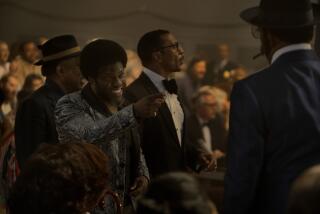Before the ‘Rumble,’ lots of soul
Most everyone remembers “The Rumble in the Jungle,” the 1974 heavyweight championship fight between Muhammad Ali and George Foreman in Kinshasa, Zaire, but who remembers “Zaire 74,” the music festival that was organized to go along with it? “Soul Power,” a vibrant and joyous new documentary, should end that anonymity.
One reason the concert is little known is that a training camp injury to Foreman led to a six-week postponement of the fight.
The three-night, 12-hour concert, which starred James Brown, B.B. King, Miriam Makeba, Tabu Ley Rochereau and many others, however, went on as scheduled but without the publicity bump the fight would have given it.
To make matters worse, Leonard Gast’s “When We Were Kings,” a potent documentary on the fight, was not released until 1996, and even then scenes from the music festival were kept to a minimum.
That situation always troubled “Soul Power” director Jeffrey Levy-Hinte, who was an editor on “Kings.” As he says in a press statement, “I was fixated on the notion that there was a tremendous wealth of material that was being sent back to the vault.” But though that makes “Soul Power” in essence the best movie ever made exclusively from outtakes, it is so much more than that.
The key to the film’s success is the one-of-a-kind background to the concert. Many of the American performers, including Bill Withers and the Spinners as well as Brown and King, had never been to Africa before, and performing there clearly meant a lot to them.
Similarly, the super-receptive Africa audience in Kinshasa, a city with a considerable musical scene of its own, could not have been more delighted to have these great artists playing for them. Excellent cameramen, often right on stage, captured the sheer joy of performance in a way that has rarely been so beautifully done.
Though “Soul Power” teases us with an opening clip of Brown on stage, resplendent in a jumpsuit with the letters GFOS (for Godfather of Soul) on the front, the film’s first section deals with the logistics of both putting the concert together and getting everyone to Africa.
We also get vivid glimpses of the daily life of Kinshasa’s residents, especially those with music on their minds. We see impromptu street musicians caught in the act as well as some of the visiting Americans hanging out with local audiences.
Though he doesn’t do much that is musical, Ali has a major presence in this film, and it’s easy to see why the filmmakers couldn’t resist including his brilliant impromptu riffs about things like the relative speed of African and American flies and why New York is more of a jungle than Kinshasa.
If anyone can upstage Ali it’s the film’s musicians, many of them captured in their prime. Among the highlights are King doing a taut “The Thrill Is Gone,” Withers a soulful “Hope She’ll Be Happier,” Big Black a stellar conga drum solo and Celia Cruz, the Queen of Salsa, knocking them dead as part of the Fania All-Stars.
Fans of African music will be especially pleased, and not just by Makeba doing an especially pointed version of her classic “The Click Song.” Legendary Zaire ensembles OK Jazz, fronted by Franco, and Orchestre Afrisa with Rochereau, do memorable sets.
The amazing thing about these 35-year-old performances is how fresh and alive they are. If ever a concert was worth the wait, “Soul Power” is the one.
--
--
‘Soul Power’
MPAA rating: Unrated
Running time: 1 hour,
33 minutes
Playing: In selected theaters
More to Read
Only good movies
Get the Indie Focus newsletter, Mark Olsen's weekly guide to the world of cinema.
You may occasionally receive promotional content from the Los Angeles Times.











